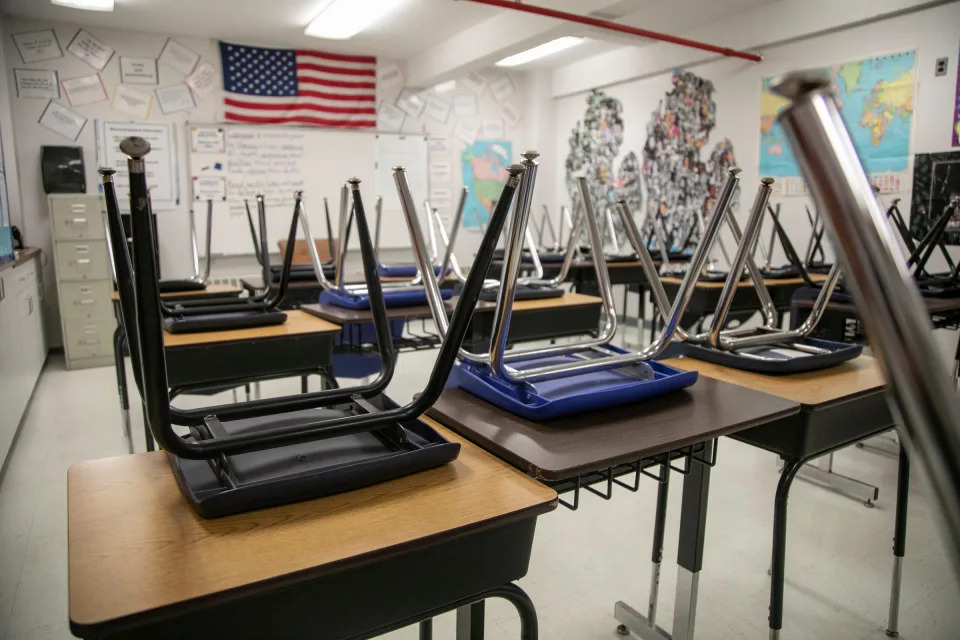Detroit Free Press
Whitmer signs bills impacting Michigan teachers and potentially bringing more to the state
Clara Hendrickson, Detroit Free Press – July 26, 2023
Gov. Gretchen Whitmer signed a series of bills Wednesday that expand bargaining power for teachers’ unions, make it easier for out-of-state teachers and counselors to move to Michigan and eliminate a restriction on setting teacher pay that only applies to Detroit educators.
“This legislation will build on our efforts to recruit and retain the talented educators that provide Michigan students with a phenomenal education,” Whitmer said in a statement.
The bills aren’t the only changes to education policy the governor has made recently. Earlier this month, she overhauled the state’s education department, announcing the creation of a new one that will consolidate early childhood and higher education programs currently spread across multiple state agencies. Last week, she signed an education budget that will provide free breakfast and lunch to all PreK-12 public school students and expand eligibility to enroll in Michigan’s state-funded preschool program.
Here’s a look at the other changes the bills signed by Whitmer will bring to Michigan’s classrooms.

Bills eliminate restrictions affecting teacher unions
Whitmer signed House Bill 4354, which eliminates restrictions on teacher’s unions from bargaining with public schools about performance evaluation systems and teacher placements. House Bill 4820 signed by Whitmer also changes how seniority is considered in public schools’ personnel decisions. Currently, length of service generally cannot be factored into those decisions.
Whitmer also signed House Bill 4044, which repeals a ban on public employers paying higher wages and providing more generous benefits after a collective bargaining agreement expires. And Whitmer approved House Bill 4233 which eliminates a prohibition against public school employers from using school resources to help unions collect dues or fees from public school employees. Bill sponsor state Rep. Jaime Churches, D-Wyandotte, touted the legislation for enabling teachers to automatically have their union dues withdrawn from their paychecks.
House Minority Leader Matt Hall, R-Richland Township, blasted the legislation. “As they hand out favors and power to their union boss allies, Michigan Democrats are continuing to undermine public education and put the needs of students last,” he said in a statement. With the exception of House Bill 4233 which garnered the support of one GOP lawmaker − state Sen. Ed McBroom, R-Waucedah Township − Republicans opposed the package bills.
School funding: Gov. Whitmer signs $24.3 billion Michigan education budget
Detroit teachers compensation
Senate Bill 359 signed by Whitmer eliminates the requirement that compensation for Detroit teachers and administrators be determined primarily on the basis of job performance. Instead, it allows teacher and administrator pay to take into account the number of years spent on the job and advanced degrees held by Detroit Public Schools Community District employees.
The bill has its origins in a 2016 Republican effort aimed at addressing financial challenges facing Detroit’s public school system which created a different process for determining teacher and staff compensation from the rest of the state.
Bill sponsor state Sen. Stephanie Chang, D-Detroit, said in a June statement that the ban on considering longevity and advanced degrees to determine Detroit teachers’ compensation was an “unfair prohibition” that has caused teachers to leave the district.
Michigan schools: Gov. Whitmer announces new Michigan education department focusing on early and higher ed
Lure out-of-state teachers and counselors to Michigan
Finally, Whitmer signed Senate Bills 161 and 162 aimed at making it easier for school teachers and counselors to move to Michigan. The pair of bills reduce the barriers both out-of-state teachers and school counselors face to work in Michigan’s schools by easing the state’s teacher and school counselor certification requirements.
Sheryl Kennedy, the legislative liaison for the Michigan Department of Education, said about a quarter of Michigan teachers moved in from out of state and the bills could make Michigan a destination for educators. “Michigan’s kind of really becoming a place where teachers really want to go from other states,” she said during a hearing on the legislation.

Senate Bill 161 enables those with a teaching credential from a federally recognized Indian tribe or another country to apply to the state superintendent of public instruction to receive a teaching certificate without needing to take teacher certification exams in Michigan. The bill also eases the criteria for those eyeing a move from another state to Michigan to teach. For example, it allows those with a teaching certification from another state, federally recognized Indian tribe or country to be eligible for a Michigan professional education certificate if they have successfully taught for at least three years in their prior jurisdiction.
Senate Bill 162 creates similar pathways for out-of-state school counselors.
